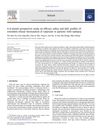The Efficacy and Safety of Valproic Acid Medications with Controlled Active Ingredient Release in Adults in Real Clinical Practice from the Position of Pharmacokinetic and Pharmacogenetic Approaches
January 2017
in “
Nevrologiâ, nejropsihiatriâ, psihosomatika
”
TLDR Sustained-release sodium valproate is effective in treating epilepsy, with some side effects influenced by genetics.
In a study conducted in three regions of the Russian Federation, 94 adult patients with focal epilepsy (FE) or idiopathic generalized epilepsy (IGE) were treated with sustained-release sodium valproate (SV) either as monotherapy (68%) or in combination with other antiepileptic drugs (31.9%). Over one year, 49.2% of FE patients and 67.7% of IGE patients achieved seizure remission with moderate (1000 mg) or low (<1000 mg) daily doses of SV. The highest remission rates were seen with Depakine Chronosphere for both FE (100%) and IGE (75%). The efficacy of SV decreased in the order of Depakine Chrono, Convulex, and Valparine XP, with no remission in patients taking Encorate Chrono. Side effects, including weight gain, menstrual disorders, tremor, and hair loss, occurred in 16% of patients, mostly at doses of 1000 mg or higher and during combination therapy. Side effects were more common in patients with certain genetic variants (CYP2C9*3). The study suggests that therapeutic drug monitoring and pharmacogenetic studies should be considered to optimize antiepileptic drug therapy, particularly to determine starting dosages and to minimize unwanted side reactions.





